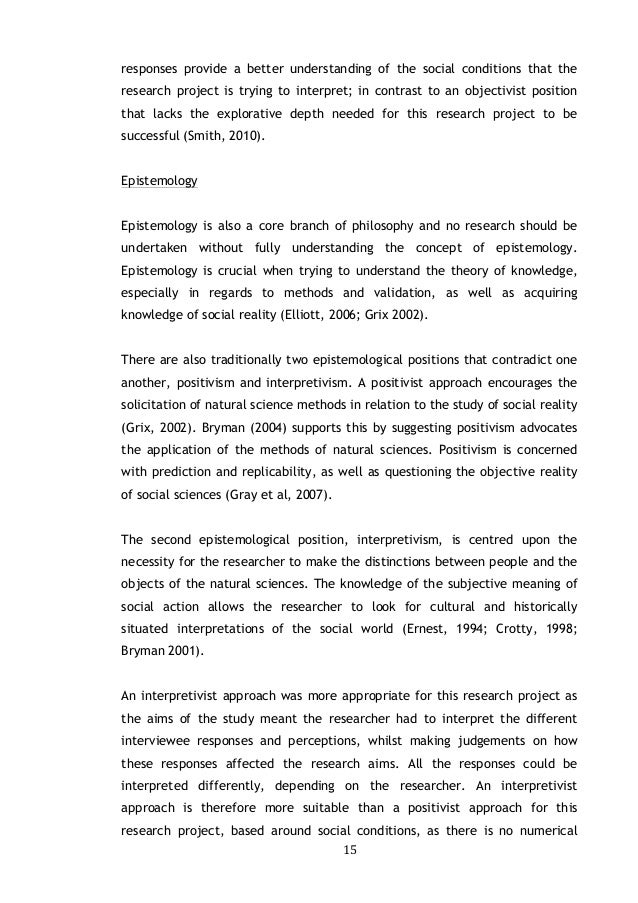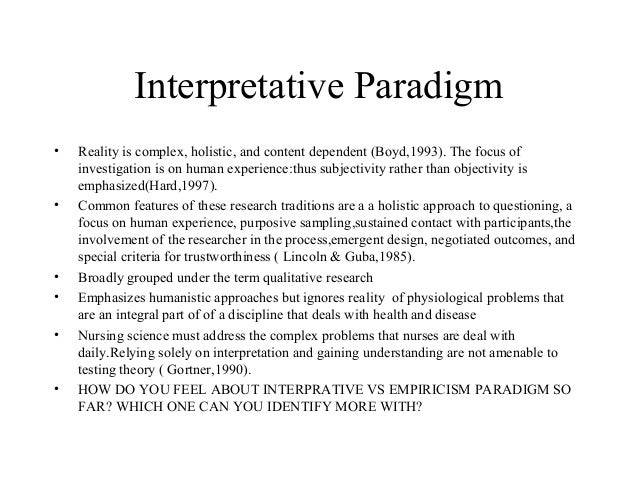This is but one example of the close relations between substantial theories in LIS on the one hand and epistemologies like empiricism, rationalism and positivism on the other. The Interpretive Tradition in Social Science Abstract The interpretive tradition has a long, rich, and diverse history within social science. Positivism and interpretivism—are typically presented against each other within the philosophy. Methodological difference between the human sciences and the natural sciences is hermeneutics.
The key difference between positivism and interpretivism is that positivism recommends using scientific methods to analyze human behavior and society whereas interpretivism recommends using non-scientific, qualitative methods to analyze human behavior.
Positivism and interpretivism are two important theoretical stances in sociology. Both these theories help in social research that analyses the behavior of human beings in society. While positivism views social norms as the foundation of human behavior, interpretivism views humans as complex creatures whose behavior cannot be explained by social norms.
CONTENTS
1. Overview and Key Difference
2. What is Positivism
3. What is Interpretivism
4. Side by Side Comparison – Positivism vs Interpretivism in Tabular Form
5. Summary
What is Positivism?
Positivism is a theory that states all authentic knowledge can be verified through scientific methods such as observation, experiments, and mathematical/logical proof. The term positivism was first used by the philosopher and sociologist Auguste Comte in the early 19th century. Comte was of the view that human society has passed through three distinct stages: theological, metaphysical, and scientific, or positive. He believed that society was entering the later stage, where a positive philosophy of science was emerging as a result of advances in scientific inquiry and logical thinking.
Moreover, there are five basic principles at the foundation of positivism:
1. The logic of inquiry is the same across all sciences.
2. The aim of science is to explain, predict and discover.
3. Scientific knowledge is testable, i.e., it is possible to verify research through empirical means.
4. Science is not equal to common sense.
5. Science should remain free of values and should be judged by logic.
Furthermore, in social research, positivism refers to an approach to the study of society through scientific methods. In research, positivists prefer quantitative methods such as structured questionnaires, social surveys, and official statistics. Moreover, positivists consider the social sciences to be as scientific as the natural sciences. The scientific methods they use in research involve generating theories and hypotheses and then testing them using direct observations or empirical research. More importantly, these scientific methodologies allow them to gain trustworthy, objective and generalizable data.
What is Interpretivism?
Interpretivism is a more qualitative approach to social research. Interpretivists are of the view that individuals are complex and intricate people, not just puppets reacting to external social forces. According to them, individuals experience the same reality in different ways and they often have different ways of behaving. Therefore, interpretivism states that scientific methods are not appropriate to analyze human behavior.
Interpretivism prescribes qualitative methods such as participant observation and unstructured interviews to analyze human behavior and society. Moreover, interpretivists believe that human knowledge of the world is constructed socially. For them, knowledge is not objective or value-free, instead, it is transmitted through discourses, ideas, and experiences.

What is the Difference Between Positivism and Interpretivism?
Positivism is a sociological approach that states that one should study the human behavior and society using scientific methodology, as in natural sciences. Interpretivism, on the other hand, is a sociological approach that states it is important to understand or interpret the beliefs, motives, and actions of individuals in order to understand social reality. In other words, while positivists try to treat sociology as a science dealing in numbers and experiments, interpretivists criticize this approach and say that sociology is not a science and human behavior cannot be explained through quantification. Therefore, this is the key difference between positivism and interpretivism.
Moreover, a further difference between positivism and interpretivism is the research methods they use. Positivism uses quantitative methods such as statistics, surveys and questionnaires whereas interpretivism uses qualitative methods such as participant observations and unstructured interviews.
The infographic below contains a more detailed presentation of the difference between positivism and interpretivism.
Summary – Positivism vs Interpretivism
Positivism
According to positivism, society and human behavior can be studied through scientific methods. However, interpretivism states that human behavior can only be studied by using more qualitative and non-scientific methods. Moreover, while positivists believe that human behavior can be explained by social norms, interpretivists believe that humans are complex creatures whose behavior cannot be explained by social norms. Thus, this is a summary of the difference between positivism and interpretivism.
Reference:
1. Crossman, Ashley. “The Evolution of Positivism in the Study of Sociology.” ThoughtCo, 8 Jan. 2018, Available here.
2. M, Paulina. “Interpretivism in Sociology: Definition & Origin.” Study.com, Available here.
3. “Positivism.” Wikipedia, Wikimedia Foundation, 31 Aug. 2017, Available here.

Image Courtesy:
1. “1552831”(CC0) via Pxhere
2. “1018333” (CC0) via Pixabay
Related posts:
Difference Between Positivism And Interpretivism Pdf Reader Free

Difference Between Positivism And Interpretivism Pdf Reader
- Orlikowski, W.J. and Baroudi, J. (1991) Studying Information Technology in Organizations: Research Approaches and Assumptions. Information Systems Research, 2, 1–28CrossRefGoogle Scholar
- Crotty M., (1998) The Foundations of Social Research. Meaning and Perspective in the Research Process, SAGE publications, LondonGoogle Scholar
- Dobson, P.J. and Love, P.E D. (2004) Realist and Postmodernist Perspectives on Information Systems Researc: Points of Connection, Australian Journal of Information Systems 12/1Google Scholar
- Chen, W. And Hirschheim, R. (2004) A Paradigmatic and Methodological Examination of Information System Research from 1991 to 2001, Information Systems Journal, 14, 197–235CrossRefGoogle Scholar
- Richardson, H. and Robinson, B. (2007) The Mysterious Case of the Missing Paradigm: A Review of Critical Information Systems Research 1991–2001, IS Journal, 17, 251–270.Google Scholar
- Latour. B. (2004), A Prologue in form of a Dialog between a Student and his (somewhat) Socratic Professor. In Avgerou, C., Ciborra, C., Land, F.F. (editors) The Social Study of Information and Communication Study. Oxford University Press, Oxford.Google Scholar
- Weber R., (2004) The rhetoric of Positivism versus Interpretivism, MIS Quarterly, 28, iii–xiiGoogle Scholar
- Pettigrew, A.M. (2001) Management Research after Modernism, British Journal of Management, vol. 12, S61–S70, special issueCrossRefGoogle Scholar
- Ciborra, C. (2002). The Labyrinths of Information. Oxford University Press, Oxford.Google Scholar
- Lorenz, K. (1973), Behind the Mirror. A search for a natural history of human knowledge, Harcourt Brace, New York.Google Scholar
- Einstein, A. (1954) Ideas and Opinions, New York, Random House.Google Scholar
- Mayr, E. (1982) The growth of biological thought: diversity, evolution and inheritance. Oxford University Press, Oxford.Google Scholar
- Ricciardi, F. (2008) The tacking knowledge strategy. Claudio Ciborra, Konrad Lorenz and the ecology of Information Systems, Interdisciplinary Aspects of Information Systems Studies, Springer.Google Scholar
- Bateson, G. (1979) Mind and Nature. A Necessary Unity. Hampton Press.Google Scholar
- Edelman, G.M. (1992) Bright Air, Brilliant Fire: On the Matter of the Mind, Basic books.Google Scholar